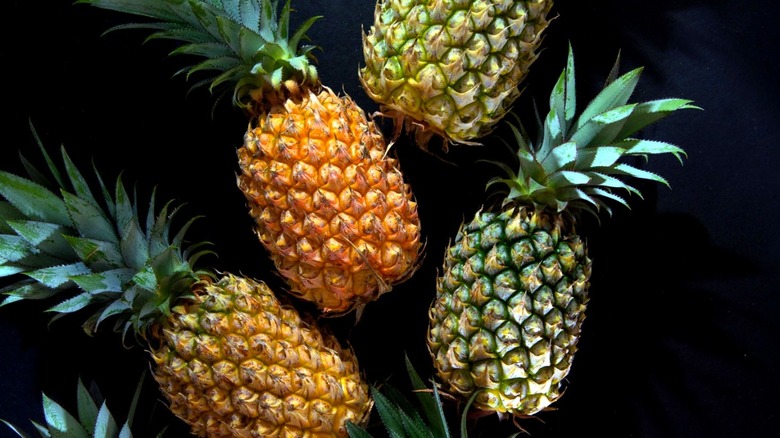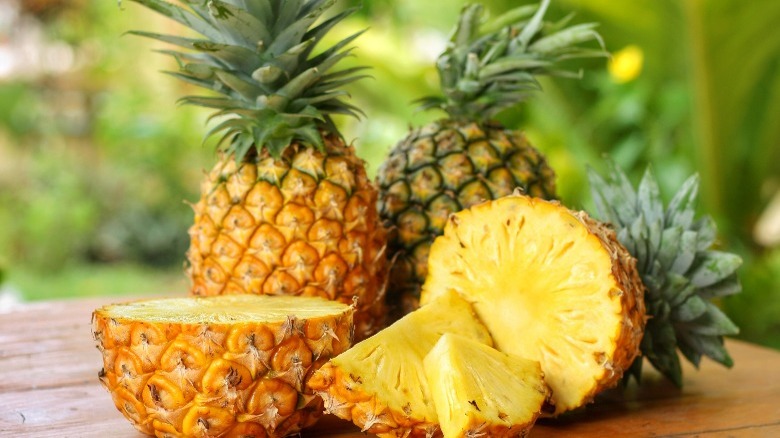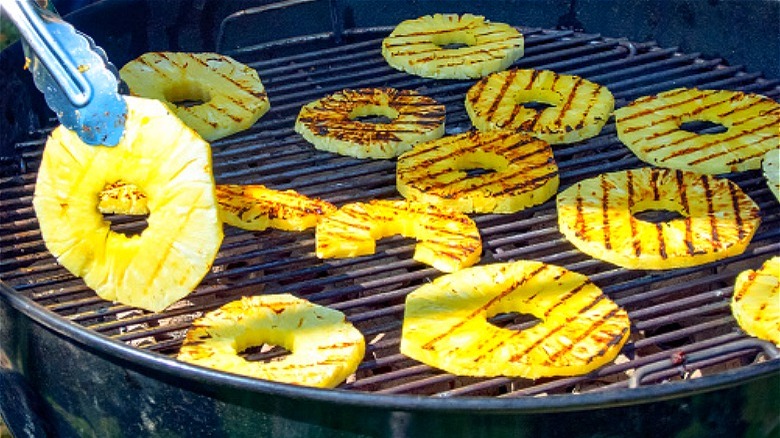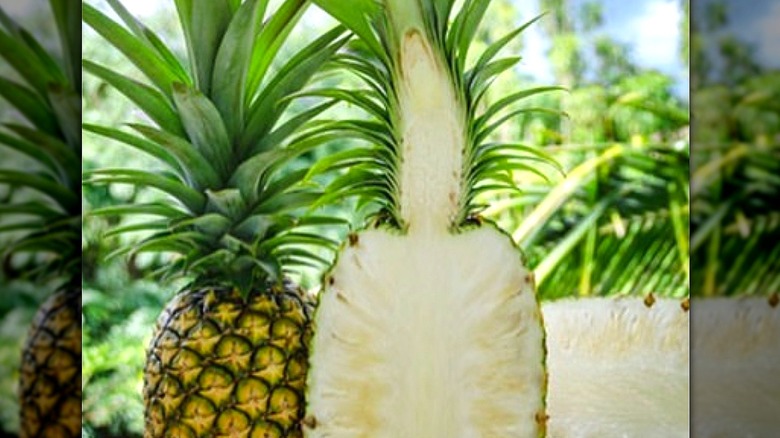The Unexpected Side Effect You Could Get When Eating Pineapple
Pineapples are a dime a dozen at today's grocery stores, which wasn't the case centuries ago. In fact, as per Historic UK, when pineapple was introduced to Europe in the 16th century, Europeans went gaga over this tropical fruit. Aside from its elegant shape and regal crown, who could deny its sweet, juicy flesh? As a result, this tropical fruit was thoroughly enjoyed throughout the centuries, but only by those who could afford its extravagant price tag.
Fortunately, in modern times, this tropical fruit is affordable and is enjoyed by all. Plus, not only is pineapple delicious, it is incredibly nutritious. According to WebMD, a cup of pineapple is packed with beneficial fiber, and vitamins and minerals like vitamin C, folate, zinc, and potassium. Moreover, this tropical fruit contains large amounts of bromelain, enzymes that in supplement form may help with conditions such as chest pain, arthritis, gout, muscle soreness, blood clots, and other ailments, as per WebMD.
Due to their health benefits, it may seem like a foolproof idea to eat pineapple by the pound, enjoying it in tangy desserts and tropical-inspired cocktails. However, before adding more pineapple chunks to homemade piña colada muffins, pineapple lovers may want to know that eating this fruit may come with surprising side effects.
What causes side effects when eating pineapple
Registered dietician Erin Palinski-Wade told Eat This, Not That!, that the consumption of pineapple may result in symptoms like tongue irritation and burning sensations in the mouth. As per the National Center for Complementary and Integrative Health (NIH), other common side effects may include upset stomach and diarrhea. The NIH also states that consuming pineapple may trigger allergic reactions in some people.
These unpleasant side effects are unfortunate, but far from a mystery; the culprit lies in bromelain, an enzyme group that degrades protein and is naturally found in pineapple. According to Mount Sinai, bromelain isolated from pineapple (and other sources) is used in medical applications from reducing inflammation due to muscle injuries to treating sinuses. Due to its ability to break down protein, bromelain is also a popular tenderizer for steaks and other meats. When munching away on pineapple chunks, some people may experience these irritating symptoms from the high concentration of bromelain, as per Eat This, Not That. What's more, as per the NIH, some drug interactions can occur when consuming bromelain.
Avoiding side effects while enjoying pineapple
Despite the side effects that may manifest while eating pineapple, this tropical fruit should not be shunned entirely. Pineapple is still a delicious fruit with a rainbow of vitamins and minerals. Furthermore, according to Erin Palinski-Wade and Eat This, Not That!, the unpleasant side effects are fairly uncommon. Still, those wary of experiencing these side effects can resort to several cooking techniques when preparing pineapple. According to Science Meets Food, bromelain can be broken down within the fruit using heat or salt. In a process called denaturation, the chemical structure of bromelain breaks apart, which reduces its potency and ability to cause unpleasant side effects.
Thus, people can easily grill, sear, or bake pineapple to denature the bromelain within the fruit. Plus, slightly charred pineapple makes for a delicious treat, whether it's grilled pineapple rings or inside a pineapple upside-down cake! Science Meets Food explains that fresh pineapple chunks can also be left to soak in salty water for a couple of minutes, which helps to break down the bromelain. Furthermore, in an interview with Inverse food scientist Karen Schaich explains that eating fresh pineapple with other foods can decrease the unpleasant sensations or side effects. "When you mix pineapple with foods," she explains, "you're diluting the effects." Otherwise, if you're still wary of eating pineapple, you should consult your healthcare provider. Though pineapple can bring about some unexpected (and unpleasant) side effects, eating a fruit salad packed with pineapple chunks likely won't hurt every now and then!
Try the sugarloaf pineapple
Among the many foods you can pair with fresh chunks of juicy pineapple, associate professor of food engineering in the department of food science at Rutgers, Paul Takhistov, Ph.D. recommends any type of dairy-filled food to counteract the acidity found in this bright, fibrous fruit (via SELF). If you "got milk" lying around, Takhistov outlines how milk's protein will "compete for the (bromelain) enzyme's attention" and your mouth will be protected by the milk's creamy consistency.
Milk aside, if you don't love the taste of cooked pineapple, you're in luck since there's one additional alternative to consider. There is one strain of this tropical fruit you can buy online, yet its sweet flesh has little to no acidity so bromelain won't be rearing its ugly when you dig in to enjoy a few fresh slices. According to Specialty Produce, the Sugarloaf pineapple is primarily grown in Kaua'i, Hawaii, and Benin, Africa. What makes this kind of pineapple so distinct, apart from its light yellow color and extra sweet flavor is the edible core and low acid count. If bromelain has been an issue for you, you might want to consider trying the Sugarloaf variety. If keeping food costs low is important, keep in mind the Kauaʻi Sugarloaf Pineapple website charges $37.95 for one single pineapple. You might want to start saving your extra dollars if the unique enzyme in traditional pineapple has been affecting your enjoyment of this juicy tropical favorite.



